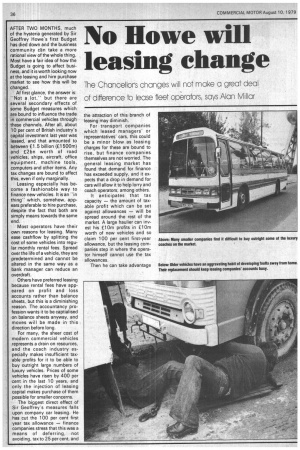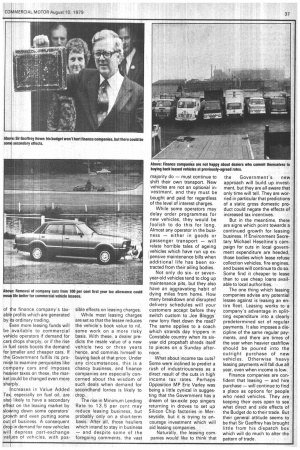No Howe will leasing change
Page 38

Page 39

If you've noticed an error in this article please click here to report it so we can fix it.
The Chancellor's changes will not make a great deal of cifference to lease fleet operators) says Alan Millar
AFTER TWO MONTHS, much of the hysteria generated by Sir Geoffrey Howe's first Budget has died down and the business community nn take a more rational view of the whole thing. Most have a fair idea of how the Budget is going to affect business, and it is worth looking now at the leasing and hire purchase market to see how this will be changed.
Af first glance, the answer is: ''Not a lot,but there are several secondary effects of some Budget measures which are bound to influence the trade in commercial vehicles through these channels. After all, about 10 per cent of British industry's capital investment last year was leased, and that amounted to between £1.5 billion (El 500m) and E2bn worth of road vehicles, ships, aircraft, office equipment, machine tools, computers and other items. Any tax changes are bound to affect this, even if only marginally.
Leasing especially has become a fashionable way to finance new vehicles. It is an "'in thingwhich, somehow, appears preferable to hire purchase, despite the fact that both are simply means towards the same end.
Most operators have their own reasons for leasing. Many ease cashflow by splitting the cost of some vehicles into regular monthly rental fees. Spread over the life of a vehicle, they are predetermined and cannot be altered in the same way as a bank manager can reduce an overdraft.
Others have preferred leasing because rental fees have appeared on profit and loss accounts rather than balance sheets, but this is a diminishing reason. The accountancy profession wants it to be captialised on balance sheets anyway, and moves will be made in this direction before long.
For many, the sheer cost of modern commercial vehicles represents a drain on resources, and the coach industry especially makes insufficient taxable profits for it to be able to buy outright large numbers of luxury vehicles. Prices of some vehicles have risen by 400 per cent in the last 10 years, and only the injection of leasing capital makes purchase of them possible for smaller concerns.
The biggest direct effect of Sir Geoffrey's measures falls upon company car leasing. He has cut the 100 per cent first year tax allowance — finance companies stress that this was a means of deferring, not avoiding, tax to 25 per cent. and
the attraction of this branch of leasing may diminish.
For transport companies which leased managers' or representatives' cars, this could be a minor blow as leasing charges for these are bound to rise, but finance companies. themselves are not worried. The general leasing market has found that demand for finance has exceeded supply, and it expects that a drop in demand for cars will allow it to heJp lorry and coach operators, among others.
It anticipates that tax capacity — the amount of taxable profit which can be set against allowances — will be spread around the rest of the market. A large haulier can invest his El Om profits in £1 Om worth of new vehicles and so claim 100 per cent first-year allowance, but the leasing companies step in where the operator himself cannot use the tax allowances.
Then he can take advantage of he finance company's taxabl profits which are generated by is ordinary trading.
yen more leasing funds will be available to commercial veh cle operators if demand for car drops sharply, or if the rise in f el costs boosts the demand for mailer and cheaper cars. If the Government fulfils its promis to examine perquisites like co pany cars and imposes hea ier taxes on these, the market ould be changed even more sha ply.
Increases in Value Added especially on fuel oil, are likely to have a secondary t on the leasing market by ing down some operators' h and even putting some of business. A consequent in demand for new vehicles depress part-exchange es of vehicles, with pos Tax als eff slo gro out dro wil val sible effects on leasing charges.
While most leasing charges are set so that the lessee reduces the vehicle's book value to nil, some work on a more risky basis. With these, a dealer predicts the resale value of a new vehicle two or three years hence, and commits himself to buying back at that price. Under any circumstances, this is a chancy business, and finance companies are especially concerned about the wisdom of such deals when demand for secondhand lorries is likely to drop.
The rise in Minimum Lending Rate to 13.5 per cent may reduce leasing business, but probably only on a short-term basis. After all, those hauliers which intend to stay in business — and despite some of the foregoing comments, the vast majority do — must continue to shift their own transport. New vehicles are not an optional investment, and they must be bought and paid for regardless of the level of interest charges.
While some operators may delay order programmes for new vehicles, they would be foolish to do this for long. Almost any operator in the business — either in goods or passenger transport — will relate horrible tales of ageing vehicles which have run up expensive maintenance bills when additional life has been extracted from their ailing bodies.
Not only do sixor sevenyear-old vehicles tend to clog up maintenance pits, but they also have an aggravating habit of dying miles from home. How many breakdown and disrupted delivery schedules will your customers accept before they switch custom to Joe Bloggs' new lorry fleet down the road? The same applies to a coach which strands day trippers in Constable country when its sixyear old propshaft shreds itself to pieces on a Sunday afternoon.
What about income tax cuts? Some were inclined to predict a rush of industriousness as a direct result of the cuts in high income tax rates. Perhaps Opposition MP Eric Varley was being a little cynical in suggesting that the Government has a dream of tax-exile pop singers returning in droves to set up Silicon Chip factories in Merseyside, but it is trying to encourage investment which will aid leasing companies.
Naturally, the leasing companies would like to think that the Government's new approach will build up investment, but they are all aware that only time will tell. They are worried in particular that predictions of a static gross domestic product could negate the effects of increased tax incentives.
But in the meantime, there are signs which point towards a continued growth for leasing business. If Environment Secretary Michael Heseltine's campaign for cuts in local government expenditure are heeded, those bodies which lease refuse collection vehicles, fire engines, and buses will continue to do so. Some find it cheaper to lease than to use cheap loans available to local authorities.
The one thing which leasing companies advise any potential lessee against is leasing an entire fleet. Leasing works to a company's advantage in splitting expenditure into a clearly predetermined set of regular payments. It also imposes a discipline of the same regular payments, and there are times of the year when heavier cashflow should be poured into the outright purchase of new vehicles. Otherwise heavy leasing payments will fall due all year, even when income is low.
Finance companies are confident that leasing — and hire purchase — will continue to find a place as options for people who need vehicles. They are keeping their eyes open to see what direct and side effects of the Budget do to their trade. But their general attitude seems to be that Sir Geoffrey has brought little from his dispatch box which will do much to alter the pattern of trade.




































































































